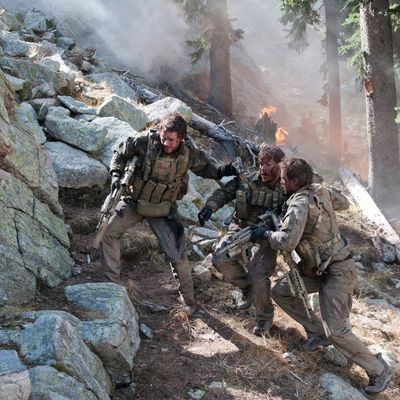
Peter Berg’s film of Marcus Luttrell’s memoir Lone Survivor is frankly worshipful: It celebrates sacrifice and sanctifies agony. In an early training montage, Berg lingers on the young Navy SEALs’ sinewy limbs and ripped torsos, marveling (in slo-mo) at their ability to endure pain with manly, near-miraculous stoicism. The prep for war is itself a near-death experience, and it’s transmutational. These ordinary American guys — guys’ guys with pretty wives and loving families — are reborn as supermen.
Luttrell, played onscreen by Mark Wahlberg, was the only SEAL standing (barely) after a 2005 Afghanistan mission to assassinate a murderous Taliban warlord went wrong. Nineteen Americans died, and Berg uses every cinematic weapon in his arsenal to make you feel each bullet as it rips through the warriors’ bodies, defiling young flesh that he has previously hallowed. The Taliban fighters take single shots to the head or chest and are dead before they hit the ground; the SEALs stay up, eviscerated but seemingly invincible. It is only the Alamo-like imbalance of forces that finally brings them down, and even then their deaths are “good.” They’re radiant as they take their last, shallow breaths. War has ennobled them.
I’m not being snarky or ironic when I say to Marcus Luttrell, “Thank you for your service.” It’s important to separate the men described in his book from their depiction in movies like Lone Survivor, which is crudely written, rife with clichés, and leaves out anything that would transform a piece of propaganda into a work of art akin to Samuel Fuller’s The Steel Helmet, Brian DePalma’s Casualties of War, or Steven Spielberg’s Saving Private Ryan.
Berg has no gift for staging battle scenes. He substitutes crunch and splatter for coherence. He turns the actors into fodder. In one scene, Berg intercuts the clear, open (albeit bearded) faces of Wahlberg, Taylor Kitsch, Ben Murphy, and Emile Hirsch as they listen to the details of the operation with shots of the targeted warlord (Yousuf Azami) dragging a man from the bosom of his family and hacking off his head before the eyes of the victim’s son. The whole movie is on that level. The problem is not that Taliban leaders never behave that way; it’s that cartoon villains do. It’s an insult to the nineteen fallen Americans to make the object of their mission look like a Central Casting hood in a Grade C Steven Seagal movie.
Luttrell’s book (written with Patrick Robinson) doesn’t question the U.S. strategy or tactics in Afghanistan, and the author is especially enamored of then-Commander-in-Chief George W. Bush as both a leader and a man. That’s his perspective, and he has earned the right to share it with the world. But Peter Berg has no excuse for not widening the perspective. The film doesn’t link the absence of air support and the near-total failure of communication in the mountains to an administration that diverted personnel and precious resources from Afghanistan to the catastrophic occupation of Iraq, leaving men like Luttrell with a tragically impossible job. Nor does it suggest that one reason good guys like Luttrell and his team had such a difficult time winning “hearts and minds” was that at places like Bagram — where this SEAL team was based — prisoners were being tortured to death by U.S. interrogators in the service of Dick Cheney’s “Dark Side” manifesto.
Instead, Berg leads you to the conclusion that these Americans were just too good, too true, too respectful. Luttrell’s operation — and his teams’ lives — might have been saved if they’d summarily executed three passing goat-herders rather than following the Rules of Engagement. I can’t imagine a single person watching the subsequent wave upon wave of Taliban fighters with their RPGs and machine-guns and not thinking, If only the Americans had put two bullets in the head of each of those guys, they’d be home with their wives and kids today. Lone Survivor is a brutally effective movie, made by people who think that they’re serving their country. But they’re just making us coarser and more self-centered. They’re perpetuating the kind of propaganda that sent the heroes of Seal Team 10 to their deaths.


